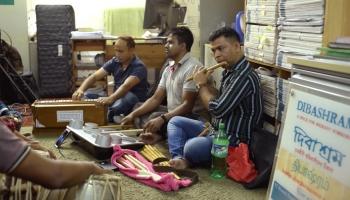When the best medicine is to serve
The line starts around noon on a bright and breezy Saturday, within a peaceful cluster of houses in Geylang.
Migrant workers, mostly South Asian, sit along chairs lined up outside HealthServe’s medical clinic hours before it opens at 2pm, patiently waiting their turn to see a doctor for whatever ails them — a cold, a pain in their back that won’t go away from the back-breaking work they do, or a gum infection.
By the time the clinic closes at 5pm, its volunteer doctors would have seen some 40 to 50 patients — a fraction of the 11,000-plus consultations the non-profit provided in 2018.
This is what a typical day at HealthServe’s clinics looks like, serving the segment of low-wage migrant workers whose employers do not provide access to affordable healthcare.
Founded in 2006, HealthServe is the brainchild of Dr Goh Wei Leong and his friends. “Twelve years ago, a friend of mine was just talking about the issues of the world. And one of the things I noticed was increasing numbers of migrant workers in Singapore.
“So we talked, and I said, ‘Hey, how about setting up a clinic for them because access to healthcare I’m sure will be a problem if you don’t have money.’”
From a “simple, small clinic”, HealthServe is now the only such organisation serving migrant workers, providing medical and social support, including a drop-in centre that serves free meals to workers in crisis. It charges S$8 (US$5.80) for GP consultations and S$15 (US$11) for dental consultations — the latter has a six-month-long waiting list. Additional care like physiotherapy is free.
And it is powered by hundreds of volunteers — medical professionals and case workers of all backgrounds — each month.
Dr Goh sees Singapore’s million-strong migrant workforce as a vulnerable group that’s also an integral part of society. “They are bringing life to our economy, life to our community. More than that, they're bringing a fresh culture. They open us up to the world and help Singapore be more resilient,” says the general practitioner.
Agrees Dr Janice Soo, who began volunteering at HealthServe as a student: “I think they are a special group of people. It’s not very easy to come to a new foreign community, totally new language, new culture, no friends, no family. If they can see a friend in each one of us in Singapore, that’s all that they sometimes need.”
HealthServe’s volunteers include Habibullah MD Al Sahriah — who goes by Habib — a youthful and upbeat Bangladeshi who first came for the non-profit’s basic English classes (which are no longer offered), and now is a much-needed translator between the patients and doctors.
Once, a doctor thought a patient had problems “in the mind”, when he had a pain in his leg. “So again we go to the doctor and talk to the doctor,” laughs Habib, who sometimes volunteers at two clinics a day, despite having to travel long distances from his dormitory.
He adds, “Every worker has a long life in Singapore. When you can come and volunteer, and talk to them, even one person, they can feel their family.”
HealthServe now has three clinics — Geylang, Jurong and Mandai — and two centres in Little India and Tai Seng. Medical and dental care remains its focus, and it is also launching a programme in mental health.
Micheal Cheah, volunteer-turned-HealthServe’s executive director, says most of Singapore’s migrant workers likely face anxiety. “A lot of them come with huge debt. Therefore, most of them come with the fear that, ‘I'll not be able to provide for my family back home, clear the debt that I owe, that my employers are not going to be kind to me.’”
In 2017, the Ministry of Manpower revealed that from from 2014 to 2016, an average of 32 Work Permit holders, including foreign domestic workers, took their own lives, each year.
“The emotional well-being of the workers is crucial. We hope to be able to not just develop programmes that would help them, we hope to develop the programmes for employers that they use wherever they are,” shares Michael.
Much remains to be done to improve the welfare of migrant workers in Singapore, and HealthServe and its volunteers hope to rally like-minded Singaporeans to support its cause.
Says Dr Soo: “I know that there are problems that exist. There are gaps and there are bridges that we need to work on. I feel that Singaporeans, we are getting more and more inclusive, we just have to take that step together, continue to engage, then we can fix the problems.”
This International Migrants Day, we honour the contributions, sacrifices and rights of low-wage migrant workers as they toil behind the scenes. Explore more of their stories here, and find out how you can support the dedicated communities giving back to them.









